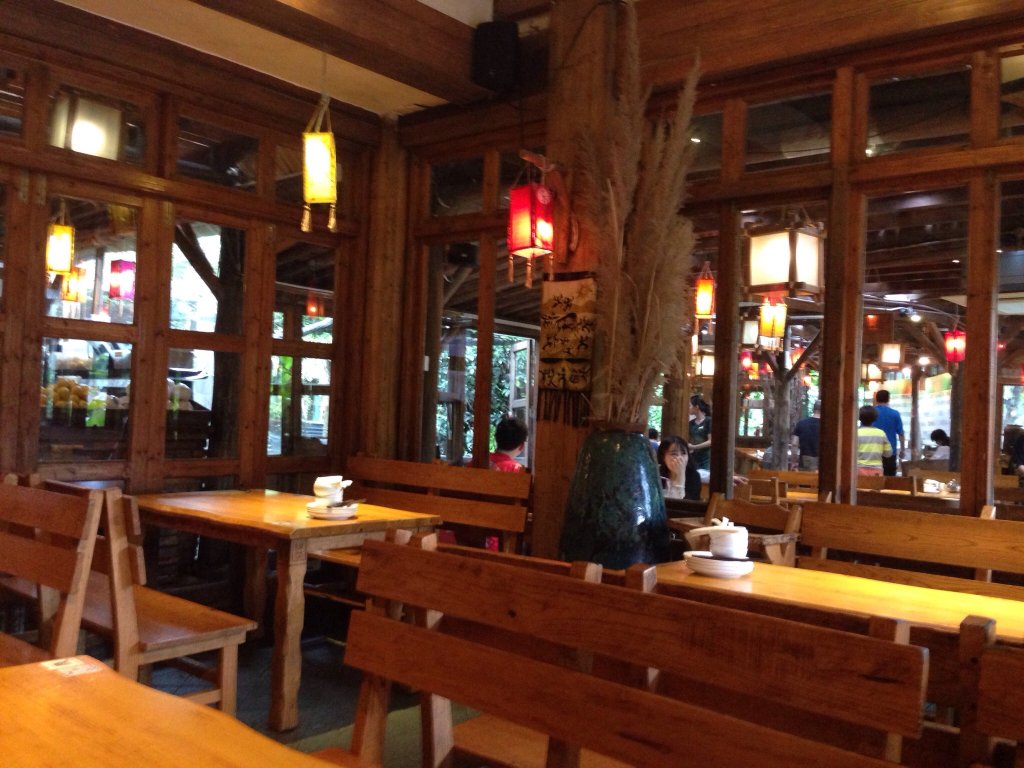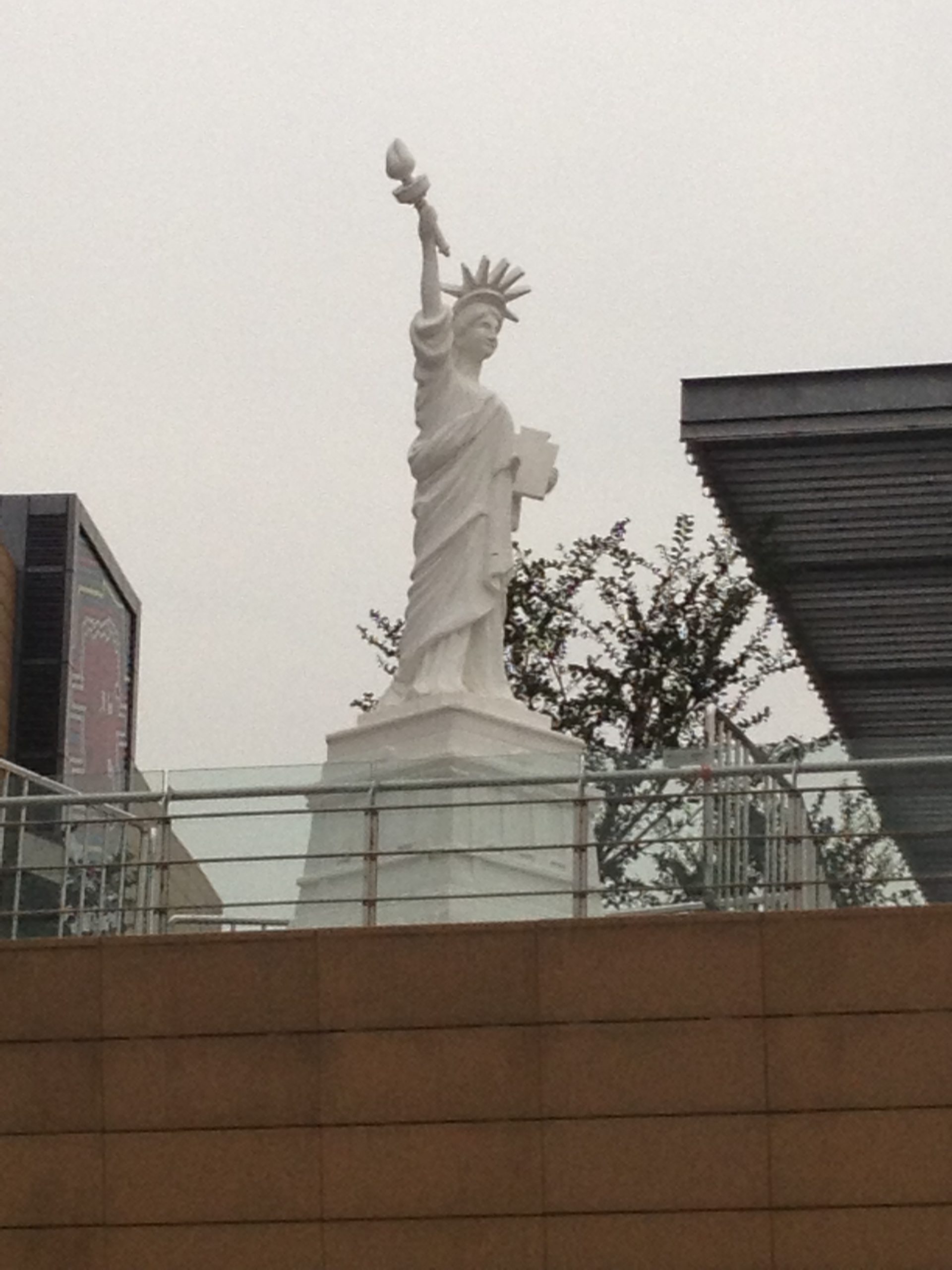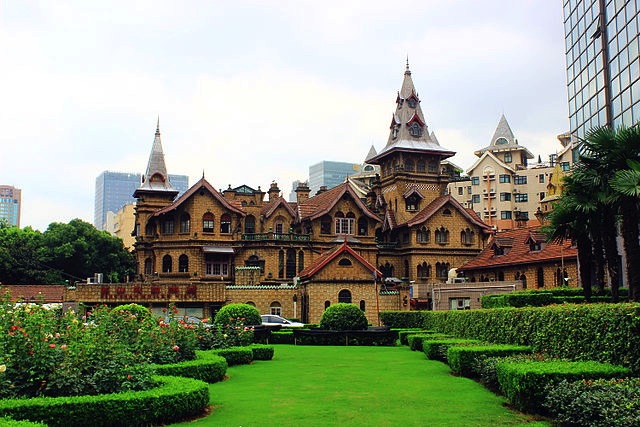November, 2009
note: This was written more than ten years ago, when I began teaching full time in China. Some slight editing and updating. My students were all undergrads in business, marketing, civil engineering, or urban planning. These notes are early observations on student life at ZUST in Hangzhou. I can’t say this email feels inaccurate years later. Life goes on, in and out of school, but the beat goes on, too – stress upon stress, and not stress of one’s own making. Smoking and environmental cancer are big contributors to early death. But stress is also an environmental constant.
The middle class Chinese diet is full of the stuff that doctors in the US tell us we should eat- lots of fish, lots of vegetables, fruit, a little liquor (ok, maybe not a little), a little meat, nuts, grains. But adult Chinese die at about the same rate as Americans, and now, from mostly the same causes – heart, and cancer. Why don’t Chinese people live forever?
One reason is stress. When life is about guanxi (relationship and who you know), then official lines of responsibility mean little. The official lines do matter, but what is more important is the friendships established over a life of school, and work, and after-work events, and weekend trips, and friend-of-a-friend contacts. So it is possible to get many things done that could not get done otherwise, because you Know People. Sort of like being related with the government in any American city. Or, better, being the one high school senior who knows the name of the maintenance guy who can open the gym a little early so the tables for the dance can be delivered on Friday night, instead of waiting for Saturday morning.
Stress Relief in Dalian
A Chinese government friend and I were driving to a museum in Dalian when she got stopped by the police. They were conducting a city sticker search- you know, the annual sticker you buy for $75 or $100 from the local government. Same in Dalian. Her car was brand new- I mean, a couple of days old. She did not have the sticker, since the car dealer is supposed to handle that, and the sticker comes a week or two later. She had the paperwork showing the car was new, and the sticker was applied for, and true to police form (anywhere, I think) they still gave her a ticket for no sticker.
She was miffed. She decided to fight City Hall, instead of just paying the $15 (which I would have done, all day long, and I guess most people in China would have done, also). She didn’t know anyone in the police department- no direct guanxi there- but her job was sufficiently large that when she went to the police station, the guardians of not letting people see the Chief did not want to mess with her. So she got to see the Chief, and pleaded her case, and got the ticket dismissed. She got to see the Chief, she said, when other people would not have gotten that far. Two lessons here- guanxi is based not just on who you know, but also who you are, and does this sound too different from how any American city works? Stress relief is possible, some times and for some little things. But a ticket is just ordinary annoyance stress. Much of Chinese school and business life is pressure, pressure, pressure, all the time.
Relationships can make projects easier, but at a cost
It is possible to get a ticket fixed in Chicago, too (so I have heard). What may be different in China is how extensive the guanxi networks are, and the willingness of everyone to use them as needed. Just like in Chicago politics, you can’t be using your Chinaman for every little thing, and you can’t pull the race card, or whatever trump you have, at every instance. But the networks are the life blood of Chinese government, and business also. Anyone who thinks rule of law in China is just a couple of court cases or law changes in Beijing away from implementation should think again about what 5,000 years of history means. Networks are as deeply ingrained in China as my disgust with Tony Cuccinello for sending Sherm Lollar, the archetype of slow running catchers, home from first base on a double by Al Smith in the second game of the 1959 World Series, and Lollar was out by – oh, about 85 feet- and the White Sox lost that game that they could have won, and they could have gone to Los Angeles 2-0 instead of 1-1, which would have changed the outcome of the series, and life forever after. That ingrained.
In China, the proper power relations can get things done – real estate projects, infrastructure projects that require cooperation across governments, business perks. But along with the ability to get things done comes the stress at relationship maintenance. How many dinners, how much late night drinking, how many hongbao, how much self-denial and relationship sucking up do you need?
Think of the second string baseball catcher, who plays, but not that often, and the team trades for a young catcher who can hit and has gotten a lot of press. Or the number 3 member of the girls’ in-group at high school, and the new girl shows up who is prettier, has more money, a bigger smile, and a more winning way with numbers 1 and 2. Think Mean Girls – The New Queen Bee. New Queen Bee Stress is constant. There is an ex-queen bee, too. What is your strategy in these situations? As the second string catcher, do you talk to the manager more, or the team leader, or just try to play harder, when you do play? What will you do if they put you to third string, or cut you? As the number 3 member of the girls’ group, do you try to get more time alone with number 1, or find some other group to belong to, or just hope the group can expand to four people? You have to keep up the network, or the network will leave you behind. And that means phone calls, and little gifts, and remembrances, and doing for others before they do for you. This is the part that would keep me digging ditches on some farm in China.
You do not have one boss, or one leader. There are usually two or three, and they need not agree. The Confucian model of respect for authority means that you must do what your leader asks, and you don’t object.
So when your leader calls, and asks you to do something, you cannot say no. You may be able to find someone else to carry out the task, but that is your obligation to find. And when the teacher assigns homework, no one says, wait a minute, we all have a test tomorrow. We must do it.
It starts in primary school – or before …
One of my colleagues was worried about his daughter. She is seven, in first grade. His daughter refuses to go to school, and cries every day about going. The reason given is that she must complete 100 addition problems before she can engage with the rest of the class. The daughter is a smart enough kid, but she is wilting under the pressure from the teachers. Teachers pass the stress on to parents, who get blamed by teachers if kids fail to keep up. And, it is China – none of this, “well, you tried your best, you can do better next time” American soft soap. If you aren’t keeping up, you are told so, and berated in front of all your classmates. “Why can’t you do better?” And none of this throwing money at programs for kids who fall behind in class. Teachers will publicly berate parents for not monitoring homework, and not requiring extra work at home. Parental responsibility, seemingly a … well, foreign – concept in the US.
At home in Hangzhou, we have a little kid audio toy, a letter, animal sound, and addition machine that we bought in China. On the addition segment, the kid is asked to push a button for the correct answer. In the US, an incorrect answer is indicated by a raspberry, or a plink or a quick low note. On our machine, a voice tells the kid in Chinese, you are very stupid.
The stress starts in primary school, and extends into high school. The later primary and high school day is generally in the range of ten to twelve hours, from about 7:00 AM to 7:00 PM. There is time included for phys ed, and lunch, and certainly art and music. Chinese high school students, at good schools, are well-rounded. And in college, they learn to sing, and dance, perform, and do art. Maybe not well, but they know the concept. Once, we had that idea in the US – you know, humanities.
I have visited a couple of Chinese high schools, and talked with a number of kids, sons or daughters of friends. My sample size is too small to generalize too much, but let me tell you what I saw. At the No. 2 high school in Fushun, in Liaoning Province, the school building is new and clean and has a big closed campus, with tennis courts and basketball courts and outdoor performance areas and lots of nice landscaping. This is a residential school, which means that most high school students live in the dorms, and only a few are day students, who are picked up and dropped off each day.
The hallway are pasted with big portraits and lists of accomplishments of political leaders and scientists and giants of philosophy. Yes, Mao and Confucius and others (that, pointedly, I do not know), but also Plato and Aristotle and Bell and Einstein and Edison and Fermi and US presidents and Franklin and Kant and Hobbes and Freud. High school. In China. And these students know who these people are, and when they lived, and what they did.
Everybody learns English, starting at various times but generally about age 7. I have seen the English workbooks for high school students and for college students. The high school workbooks, in English, rival what I would expect to see in English in the US. Participles and mood and future perfect and obscure terms and phrases. Long passages to decipher and get the meaning. The college workbooks are harder. Long passages in technical fields, economics or engineering, to decipher, along with differences between US English and foreign English. I am teaching three courses right now- a negotiation course, an economics course, and an environmental course- in English, of course, and the student level of understanding is pretty good. But the technical terms in these three courses are a little daunting for American students, and the only way for Chinese students to keep up is to study, all the time.
… and continues in college …
I just now talked with one of my students, a third year student in marketing. She would like to do fashion design, but as she says, “I cannot do that.” She has obligations to her parents and to the school, now, and to the society. Students in college in China select a major in their first year – or have it selected for them – and stay in that major for four years. There is one chance to switch majors, at the end of first year, but only if you are in the top 15% of your class and the program to which you want to switch will take you. How many majors did you have in college?
Ms. Liu is a smart kid, and her English is very good (although she thinks it is not) and the other students look to her for interpretations in Chinese but also for information about other happenings at school. She is always prepared.
I asked if she had ever been unprepared for an exam in college. “Yes,” she said, in her freshman microeconomics class. “How did you do?” “I got a B,” she said, ashamed. A whole country of Type A people.
But lots of them don’t want to be Type A people. They know that going to university in China is a big privilege, and the society is investing a lot in them, and “from those to whom much is given, much is expected.” But Ms. Liu does not feel free to change her major to fashion design, and she feels that she now has no motivation to do the things that she must do. Now these are not unfamiliar complaints to any of us, and it is easy to use one student as a metaphor for millions. Ms. Liu will certainly do fine, and she will snap out of her funk.
But the story is one I hear repeated over and over again, not only from students but from faculty and government officials and people in business. The sense of obligation to the group, or the greater good, is important and useful to building a society – we have seen that in the last thirty years.
Costs of obligation are passed on to parents, students, employees
But I don’t doubt that the stress, expressed in the form of heart conditions, and blood pressure, depression and lack of motivation are one reason why Chinese do not outlive Americans. When Americans work sixteen hours a day, 7 days a week, they do it because they want to, or because they know it is a temporary condition – get this project completed, and we can go back to normal. But in China, it is a constant sword of cultural obligation hanging over everyone’s head. It is the constant, I must do it. (2019 update – it is now common for companies in the US to demand that some employees be available 24/7 for texts and emails. That is certainly Chinese. But there is now a movement in the US for the “right to disconnect” during a good part of the day. That will certainly not be Chinese).
I have a friend, a Ph.D. from my school here, who is spending nine months at a school in Houston. She is unhappy about her living arrangements, and feels trapped by the situation, and not able – culturally – to do anything about it. She is on a nine-month sabbatical, in school and supposed to be learning some things, but she is in the US and one thing I know is that she should be having some fun. She is not, and all because, as she says, I must do it wo bi xu zuo. An American friend of mine recently returned to the US from a six-month academic fellowship in Scotland. I don’t think he wore a hair shirt for six months.
college and beyond …
Lots of Chinese students apply to college or graduate school in the US. A lot of the Chinese government students I have had in Chicago have a leader, or a friend, with a son or daughter who is 12 or 17 and wants advice about admissions. So far, so good. But too often the parents have given the student a high bar – “if you cannot get into Harvard, or MIT, or Stanford, then your life is a failure, and you are a failure to your parents and family and nation,” or something to that effect.
Now there are parents like that in the US. But I think there are more in China, and not just because of the population difference. This is the meritocracy gone mad, the sense that the perfect is in fact the enemy of the good, and individual achievement and wishes matter less than societal approval and the ability to find a job that will make a lot of money.
Amy Chua, the NYU law professor, is the poster woman for parental stress, passed on to her kids. As a law professor at a major American university, she is not going to display a laid back, devil-may-care attitude. But her Tiger Mother book is a call to arms for parents whose approach to parenting does not intentionally impose severe stress on their kids. It is no doubt true that parental encouragement, even stress, can make kids better at whatever task is demanded, and usually the long term effects seem inconsequential. The question is always for whom the kids are being pressured – for their own long term benefit, or that of the face and glory of the parents? Even for Amy Chua, the answer to that question is not so clear.
And lots of Chinese students do end up in the US, or Australia, or England, or Germany, at small schools and big schools that are not ranked in the top 20 schools in the nation. And everyone seems to survive that diminished status. But the stress and shame are not good things, for the kid, or the family, or China. The suicide rate for Chinese students is far higher than that for American students.
Students- at least at my university- have between 35 and 40 class periods a week, at 45 minutes a pop, so about 25 to 30 classroom hours a week. This is the demand for 10 or 12 courses per semester. On top of that is homework, of which there is quite a lot. Papers and tests and assignments, just as in any college course. I have told you before that fun does not seem to be in the course catalog. I still think that is true. College students seem tired in the US also, but here the extent of sleeping in class (not so much in mine, I am happy to point out) is remarkable. And there seems a general sense- not universal, of course – of simply walking through the motions.
That is supported by ideas about entrance to schools in the US and China. Faculty here tell me that in the US, it is easy to get into college and easy to flunk out. In China, they tell me, it is hard to get in, but once in, you are assured of graduating. College is almost like the reward for the intense work in high school (30 class hours per week, and no sleep, and lots of stress. All effort is focused on the Gaokao, the one-time only college entrance exam taken in senior year. Midway through junior year – “only 335 days until the gaokao!”).
I don’t mean that there are no students playing basketball, or tennis, or ping pong, or singing in the singing contest. All students here just had two days off so freshmen could participate in the annual sports day, which is kind of like the senior class games weekend. Everybody goes to the stadium and there are vendors and student cheering sections and flag waving for some group’s favorite student athlete, and 110 meter hurdles and sprints and broad jumps and other events. China is full of contradictions, so I can’t claim definitive knowledge. But this is what I see, and what I sense.
the system grinds away, through adulthood
Students like Ms. Liu pick a major to study in their freshman year, and for the next four years, the students in that major take all their classes together, study together, and live together in the same dorm and with each other. Four college girls in a room about the size of your bedroom, with their clothes and books. For some students, the school picks the major for them, and that major is where nearly all of them stay for four years. So when Chinese people come to America, and say that they have a college friend to see, they are going to see more than someone they were buddies with for a year or two. These are the lifelong, guanxi networks operating, at long distance and years apart. When was the last time you spoke with your college roommate? One of my government official-students from IIT in Chicago, someone who was in Chicago in 2004, called me from Nanjing. He is at a training seminar for a week, far from his home in Shenyang. He was going to get on a bus, travel for four hours to see me, and take the bus back to Nanjing for more training. While I am flattered that I have such an impact on people, I am sobered by the idea that someone would think such a thing thinkable. But guanxi, and networks, and respect for authority, including teachers, runs deep.
Two days ago I attended the alumni reunion, in Hangzhou, of all the CCP government officials from Zhejiang Province who have been to IIT in the last 6 years. A lot of people came- my guess is over a hundred and fifty. There was the big screen repeating slide show, pics of government officials at IIT, when they were in college, and maybe more recently. And below one of the repeating slides was the reminder, We Are Family. This is not just some pop music line, or a marketing campaign. Far more than in any fundamentalist family in the US, here the family is the primary unit in society. And family extends to CCP as well. The government students in Chicago had a leader then, and he is still a leader in their minds, with lesser status over time obviously, but still a person of respect and honor. Another leader to honor, among the two or three or four that everyone has already. The beat goes on, for good and ill, in everyone’s heads, all the time.



 Chen dongfan, the author, and Brenna, my daughter – May, 2011
Chen dongfan, the author, and Brenna, my daughter – May, 2011







On passing the academic intellectual torch
William Kirby is a renowned China scholar at Harvard. He has written a dozen books on Chinese history and our relations with China. He has a long list of accomplishments at the highest levels of international academia and professional societies.
When he writes about superior universities in Germany and the US and China, I can only marvel at the scope of his erudition. So I feel a bit out of my element commenting on his latest book Empires of Ideas: Creating the Modern University from Germany to America to China.
Kirby writes that on academic engagement with China the educational resurgence is much less a threat than an opportunity for American and other international universities…. American research universities have been strengthened enormously by recruiting Chinese doctoral students, themselves largely graduates of Chinese universities, who are admitted exclusively on the basis of merit. Our faculty ranks, too, are augmented by extraordinary Chinese scholars. We restrict these students and colleagues at our own peril. Today, any research university that is not open to talent from around the globe is on a glide path to decline.
True enough. Kirby is familiar with the finest research universities and students in China and the world. Some Chinese students go on to excel in academia and business, scientific and professional worlds in the US and China – fewer right now in the US, and that is an issue for American xenophobia.
Kirby is talking about intellectual leadership. In his historical progression, the 19th century German university model of openness and serious intellectual pursuit passed to the US in the 20th. He says the leading research, learning and education model for the 21st century is now being passed on to Chinese universities. No nation has greater ambition than China, or ability to devote resources to higher education.
Kirby’s approach to international cooperation is what one would expect from a man with so many interconnections – diplomatic and deflecting on sensitive issues and no one can fault that. It is sophisticated and mature. In Empires of Ideas, one is reminded of the marketplace of ideas, the informal, collegial and multinational networks that were part and parcel of the Enlightenment. Free exchange of information and ideas advanced science and engineering and freedom. True then, and true now.
I want to push back a little, though, basically to report on what I’ve seen at schools not in the top ten of universities in China. Kirby sees engagement with Chinese universities as an opportunity, not a threat. I agree. More exposure to the world is a good thing. But we should not fool ourselves into thinking that (1) there are always good intentions behind the dinners and smiles; and (2) most Chinese students are international work-force caliber.
On (1), no one should assume that exchanges are all collegial. CCP has weaponized exchanges within the academy and between businesses. For evidence, one need look no further than the hundreds of cases brought by the FBI against researchers, Chinese and American, seeking to steal IP from university labs and from businesses. FBI director Christopher Wray’s “whole of state” threat from China is not hyperbole.
On (2), no one should fault Kirby for addressing the university environment with which he is familiar. But most schools, faculty, and students are not in that top 5% internationally. We know the myriad stories of cheating and plagiarism in schools in China, and students who come to the US with the same attitudes toward doing the work. I’ve seen myself how lack of respect for honest work tends to bring down the performance of an entire class, including that of domestic students. We know the Yale-Peking University program was cancelled in 2012, partly attributable to allegations of widespread plagiarism and cheating.
Dishonesty in academic work is not unknown among American students. But I know of many instances in which faculty at schools in China simply turn their backs on cheating in exams. And they get little administration support when they try to restrain the dishonest behavior.
We know cheating on the college entrance exam – the gaokao – is controlled more now than a decade ago, when attempts to control cheating resulted in an angry mob of 2000 parents yelling at test administrators. “We want fairness. It’s not fair if you won’t let us cheat.”
The national push in China to control cheating resulted in some odd experiments. At our school in Hangzhou the new president decided to promote an honor code in final exams, as is the case at nearby Zhejiang University (Zheda), one of those top schools in China. This is not to take anything away from Zheda. There is an honors option in the Global Engagement Program, designed to cultivate Chinese students for work in international organizations. The program is conducted in English. Professor Kirby would be happy to engage with these students, some of the best and brightest in China.
But at our provincial-level school an exam honor code was DOA among both students and faculty – no one thought it could work. The only faculty member who could give voice or pen to objection, though, was me. Everyone else had careers on the line. I didn’t have to care. But what the president wanted, the president got.
Before the honor code was to be implemented, I did my own experiment. In one economics course I had plenty of scores from homework, quizzes, and a midterm to provide final grades. I had noticed years before that a final exam with a significant weight – 30% or 50% of a final grade – almost never changed a grade from that going into the final exam.
In class we had some discussion of the honor code. I proposed an experiment. The final exam would only count 10% of the final grade. But I would hand out the exams and leave the room for two hours and we would see what result. No monitors in the room. If students cheated, others were supposed to report them to the instructor for consideration, as the university president proposed.
I also arranged with six of my very good students, three foreigners and three Chinese, to take the final exam a day earlier and then take it again during the whole class exam. In the whole class exam they were to very obviously cheat in any way they wished, but so that other students could see. Open textbooks, read from notes, use phones, copy from other students. Make it obvious. And oh, yes – the whole class exam was different from the one I gave my star students.
You can guess the result – my good students cheated as best they could, and no one reported them to me. When my six finished the exam, they hung around outside the exam room and took pictures of students getting up from desks to look at other exam papers and using phones with abandon.
I don’t know if you call the experiment a success or a failure. But no one told me I had to use the honor code in subsequent semesters.
There is little sense of honor built in to these students. Lots of American students are no different. But an honor code needs good intentions. What good intentions do exist can get waylaid by pressures from family, culture, and particularly CCP.
Kirby is impressed by the earnestness, even in the current days of trauma and contestation, with which Chinese academics pursue joint arrangements with American schools. On one hand, that is understandable. Chinese academics are desirous of contacts for academic and personal reasons (including the ability to publish in western journals and to get their own kids into American schools). Kirby alludes to the CCP corporate overlords that can work to encourage or discourage such arrangements. For a few years before 2012, university joint ventures of all kinds were the rage. CCP pushed for engagements and wanted measurable results. A couple of my Chinese government students from Chicago were responsible for those foreign outreach programs. The pressure to get some agreement was palpable – one-way semester exchange, two-way, with or without American faculty in China, some sort of joint program, and even in some cases a joint degree with an American school. My school had a joint civil engineering degree program with San Francisco State University. A couple of years in China and then to the US for the last two or three years. The American degree was worth something. The Chinese degree – not so much. Until recently there was no international accreditation for most Chinese engineering degrees.
We need the Chinese students, undergrad and PhD candidates, for our own development. But we should not lose sight of the ill-preparedness and ill will that still lurks.
Plenty of Chinese, students and families, come to the US for education and business and – dare I say it – the freedoms that accompany a green card. There are tens of thousands of Chinese immigrants to the US each year – 150,000 in 2018. I know several student immigrants personally- come for the advanced degree, stay for the high-paying job. Quite often, their parents tell them not to come back to live, but to stay in America.
Not so many Americans go the other way.
Kirby is right to promote engagement for the good of American schools and students and faculty. Some Chinese universities may well join the upper ranks of international schools in the next ten years. But I hope he – and other administrators and scholars – can go into the engagements with a bit of the skepticism and hard evidence-seeking that led to dismissal of Confucius Institutes at the University of Chicago, Penn State, William and Mary, SUNY, Oklahoma, Texas A & M and others and cancellation of the Yale-Peking U program and consideration of the continual warnings of Chinese deception and theft from attorneys experienced in Chinese business arrangements. Harris Bricken is a good example.
We can take a hint from Ronald Reagan’s treaty policy with the Soviet Union – trust but verify. The expensive dinners and gifts and warm smiles are enticing. Its easy to become enamoured under the influence the velvet-gloved fist. I keep thinking of Sergeant Phil Esterhaus’ warning to street cops before going out on patrol in Hill Street Blues –“Let’s be careful out there.” It can be hard to do that, especially after the wining and dining and graciousness of their potential partners. But Kumbaya this ain’t.
I don’t have hard recommendations for administrators of great American universities. But they should jealously guard the reason they became great in the first place – freedoms of expression, dissent, and honesty in relationships. Too often we have let the Chinese camel’s nose into the academic tent to the detriment of American academic quality standards, research and innovation. A little caveat emptor is always a good idea.